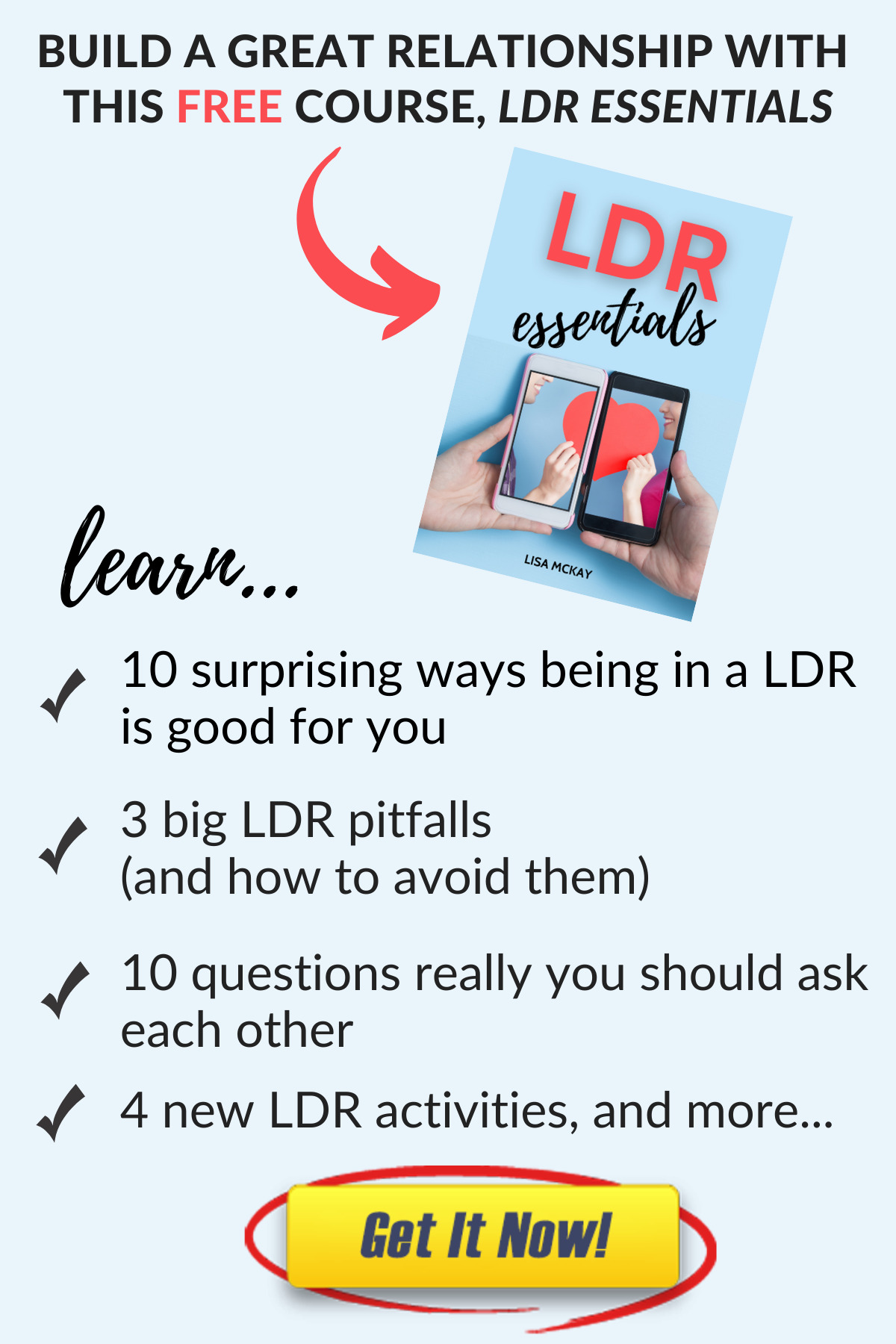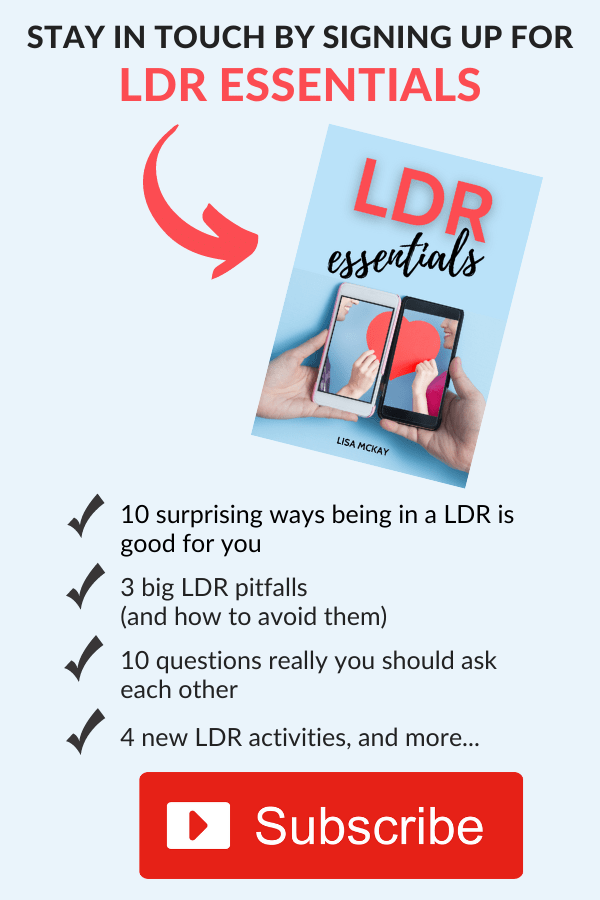Everyone knows that long distance relationships are hard work, but what does that mean, exactly? What are the most common and serious long distance relationship problems out there? Can they be fixed, or are most long distance relationships ultimately doomed?
Don’t despair! Long distance relationships can totally work. They can even prove to be good for you, for a season. I know this first-hand—I met my husband via email when he was living 7000 miles away.
However, let’s be realistic, too. Long distance relationships are tricky to navigate well. And there are some particular long distance relationship problems that don’t plague same-city relationships to the same extent.
Let’s look at some of those now. What are the most common long distance relationship problems, and how should you deal with them?
Long distance relationship problems #1: Feeling like you’ve got nothing to talk about
Ever gotten stuck in a rut and struggled to find things to talk about with your long distance love? Have you ever felt heartsick with longing to be with your partner, but also feel like you just have the same-old tired conversations over and over again when you get on the phone?
This is one of the most common long distance relationship problems. These sorts of “dry periods” are normal in long distance relationships, but that doesn’t make them any less depressing and frustrating.
What’s the fix?
One easy short-term fix for this is to come up with some questions to ask your significant other! Grab a pen and paper and write down 10 things you’d like to ask them. Or save yourself the time and grab a book of discussion questions that will spark hours of fun and fascinating talk time. Here is a good one for couples in LDRs:
Another helpful tip is to try to relax about this. Everyone in a long distance relationship goes through periods when they feel they don’t have much to talk about. You might have a season where you talk every day, while other times you only connect once every couple of days.That’s normal. Don’t let it freak you out.
2. Talking TOO much
Wait just a minute, you might be wondering. Doesn’t everyone rave about how the biggest benefit of a long distance relationship is that it forces you to communicate? Is it even possible to talk too much when you’re in a LDR?
Yeah, it really is.
In a new long distance relationship, spending hours and hours every single day on the phone or Skype breeds an intensity that can move you along too fast, and establishes intense communication patterns that can be difficult to change later.
In a more mature long distance relationship, you still shouldn’t spend so much time talking that other important areas of your life suffer greatly. That lack of balance will only hurt you in the long run.
What’s the fix?
Try to talk, text, and write at a pace that feels sustainable and balanced, and make sure you are still spending some energy and time on other important things in life (fitness, friends, and other sorts of fun). Check out this article for a more in-depth look at this issue.
3. Needing them to answer immediately
Have you ever sent a text and then stared at the phone impatiently, waiting for them to answer you right away??
We all have, right? But for some of us this becomes a pattern, a habit, or a “need.” We start to expect and need them to pick up the phone every time we call, and answer every text or email straight away.
This sort of neediness and pressure isn’t good for your relationship in the long run, and it is a sign that you’re not feeling very secure in yourself or the relationship.
What’s the fix?
Ask yourself what’s really at play here.
Do you get the sense that your SO not responding to you as quickly as you’d like sometimes because they’re genuinely busy or they need some time alone? Or are they routinely blowing you off and leaving you in limbo for long periods of time?
Are your hopes and expectations about response time reasonable? And are they coming mostly from your genuine excitement to connect with your SO, or are they often coming from a place of needing the contact and reassurance that they are interested in you to feel happy?
If your expectations aren’t reasonable, or largely coming from your own sense of need and insecurity, look for ways to improve your sense of security and self-esteem and learn to tolerate uncertainty better (see point 8). Also, check out this piece on healthy communication.
4. Growing apart
If your love moves far away and some aspects of your relationship pause or slow down, the rest of life continues. You don’t stop learning and growing and changing just because the person you love isn’t there every day. Neither do they. You are both accumulating experiences. Some of these experiences will change you.
When you’re in a long distance relationship it can be harder to identify ways in which your partner is changing, and track with them through that process.
The reverse is also true.
No matter how much you love each other, there is a real chance that a slow drift during your time apart will cause you to grow away from each other in ways that frequent flier miles cannot fix.
What’s the fix?
This is one of the hardest long distance relationship problems to fix. Talk about this risk with your partner. Discuss what you should do if one or both of you starts to feel that you’re drifting apart in important ways. And here are some things that will help prevent that from happening:
- Both agreeing that you want the distance to be temporary, and having a close-the-gap goal in mind.
- Regular visits in both directions
- Maintain good, regular communication and find a way to continue to learn new things and grow closer together even while you’re far apart. Check out our Great Dates Bundle below to find our best resources for helping you stay truly connected while you’re far apart.
5. Putting the rest of your life on hold
Have you stalled in life? Do you find yourself moping around all the time, thinking about how much you’re missing your partner, and just longing for your next skype call or visit?
Do you feel as if the rest of your life is on hold until you can be together?
Does it seem like too much effort to go out with friends or do something by yourself?
When you’re in a long distance relationship, it’s alarmingly easy to allow other important things in life—family, friendships, hobbies, exercise—to stall. But this will only make you more depressed in the short term and hurt you in the long run!
What’s the fix?
Do not spend every spare minute talking to your partner (or daydreaming about said partner). You can’t rely on your partner completely to make you happy, you should be relying on them to add to your happiness. While you’re long distance, you need to build a life where you are—a life full of friends and fun.
Do things that make you fitter, smarter, and happier. Do things that interest you. Do these things alone, if need be. Check out this piece on 10 Things You Can Do Today To Make You Happier In Your LDR. And, remember, investing in yourself is another way of investing in your most important relationship–the one you’ll definitely be in for your entire life. Start now.
6. Getting too tired or lazy to talk well
Couples in long distance relationships often speak about how the distance has actually helped them learn to communicate well, and at a very deep level. However, the opposite can also be true. Distance can also enable poor communication patterns to become established.
Of course, there will be periods when you talk constantly, and periods when you don’t talk for a day or two (or longer). But especially when one or both of you is busy, it can become easy not to invest in connecting deeply with your partner. In-depth conversations can become fewer and farther in between. It can become habitual to mostly talk about how your day was, or keep the conversation fairly superficial and brief. That’s when you have a problem.
What’s the fix?
Set aside some “skype date” time at least once a week that’s dedicated to more than talking about how your day was.
If you’re feeling very busy or tired, it may also be helpful to dial back the talk time for a while. Try talking only a couple of times a week for a while so that you can recharge. Or spend some “virtual time” together doing something that doesn’t need talking (like watching a TV series together while you’re connected on video.) Do some research and find some fun virtual dates. Then, when you do talk, focus. Make it count.
7. Connecting well across different time zones
I think everyone in a long distance relationship has moments when they feel a bit crazy, but couples in LDRs involving a significant time zone difference probably have more than most.
Time zone differences make connecting and communicating (already a challenge in LDRs) even more difficult. You need an extra dose of empathy and imagination to keep in mind that your partner is experiencing an entirely different part of the day or night. You need extra patience and understanding when you’d love to have a long romantic chat in the evening and they’re busy eating breakfast and getting dressed for work.
What’s the fix?
When you live in a different time zone than someone you love, scheduling some connections (and creating a routine out of them–like a weekly Thursday night Skype-date) becomes even more important, because the chances diminish that you’ll catch them with a quick, spontaneous phone call.
Scheduling your calls in advance can also take some of the stress and distraction out of the relationship—you’ll spend less time during the day wondering if and when you’re going to talk to each other. And if one of you can’t make it at the scheduled time, you know when you’ll probably talk next.
So when you’re in a long distance relationship across time zones, figure out when you tend to be most awake, alert, and able to be present for long distance dates. Take that into account when you’re planning out times to connect. And if you want more ideas for coping with different time zones, check out 13 Tips For Dealing With Different Time Zones In A Long Distance Relationship.
8. Feeling insecure
We all feel insecure in ourselves and our relationship sometimes. We all have moments when we feel threatened or inadequate, when fears and worries run away on us, and we get anxious. We all sometimes hit low points, or have bad days, and look to people we love to provide encouragement and reassurance. That is normal, and part of the give and take of loving, trusting, growing relationships.
However, chronic insecurity is a much bigger problem that will take a big toll on you and your relationship over time. Feeling chronically insecure means you can’t relax and engage with your partner in an intimate, authentic way. And the actions that often arise from insecurity–constantly asking for reassurance, often feeling jealous, making accusations or demands, checking up on people–erode trust and make you look needy and less attractive.
What’s the fix?
If insecurity is something that comes and goes, it can often be be healthy and helpful to voice your insecurities and fears when they pop up. Tell your partner how you’re feeling and what you’re worried about. This practices authentic and good communication, and gives your partner a chance to respond and reassure you, and get to know you better.
If, however, deep insecurity is something you know you live with most of the time, no amount of reassurance from your partner will ever be enough. You will need to learn to reign in your insecurities yourself. For more on this, you can start with: 4 Ways to Stop Feeling Insecure in Your Relationships.
9. Jealousy
Feeling a little jealous now and again is not unusual in a relationship, particularly when you are separated from your loved one. A little jealousy can even spark fresh attraction and a new appreciation for your partner.
However, while a single candle can illuminate a room, a blaze can burn it to the ground.
Uncontrolled jealousy can lead to a destructive combination of suspicion, possessiveness, insecurity, anger, and shame. If you’re feeling jealous, it’s a good idea to figure out how to control your jealousy before it starts to control you.
What’s the fix?
Learning to control jealousy is not always easy and doesn’t happen quickly, but it can be done! Take a look at this in-depth article for more on the nuts and bolts of how to get a handle on overcoming jealousy: 6 Smart Ways To Stop Feeling Jealous In Your Long Distance Relationship.
10. Jumping in the deep end
Growing apart is a particular pitfall for couples that were established before they started doing long distance. Couples who (like I did) start their relationship across distance face almost the opposite problem—the temptation to become too emotionally intimate, too quickly.
In some ways, getting to know someone via email and phone calls can help your relationship. The distance can force you to talk about all sorts of things you might not have discussed if doing other things (or, um, each other) was a realistic option. When there’s nothing to build your relationship on but words, you can get to know someone’s heart and mind at a very deep level, quite quickly.
On the other hand, falling in love long distance is a risky business. When you start dating someone you’ve never met in person, it’s very easy to assume that they possess all sorts of charming qualities. It’s easy to believe that they are “perfect” for you. It’s way too easy to move too fast in your head and your heart, and to make serious commitments before you’ve ever met.
What’s the fix?
Remember that the rules of long distance relationships should be the same as those posted at public pools: Walk, do not run. And no diving in headfirst.
Take your time getting to know each other. Don’t let your head and heart run away with you. Approaching your new relationship in a measured manner may yield benefits for years to come.
If you’re in the first 6-12 months of your long distance relationship, check out this special EARLY DAYS bundle. It contains all our best long distance dates resources PLUS a special guide written for couples who meet at a distance–From Stranger To Lover: 16 Strategies For Building A Great Long Distance Relationship.
11. Miscommunications
Miscommunications and misunderstandings happen frequently in relationships. They happen when you share the same house with someone. They happen even more frequently when you’re miles apart and sharing life via emails or a phone line.
During the early stages of my correspondence with my husband, Mike, three consecutive emails of mine ended up in Mike’s junk mail folder. Luckily for me, Mike is not easily offended or hurt (or, for that matter, deterred). If he had shut down and stopped writing to me because he assumed that I’d stopped writing to him, we may never have figured out what had happened.
Another time, Mike and I were discussing something that I was very worried about. I explained my fears and Mike said, “That’s a fair concern.”
What I interpreted that to mean was, “Yeah, you should be worried about that.”
However, after further discussion it turned out that what Mike had actually meant to communicate was, “I understand why you might be worried about that, but it’s not going to happen.”
If I hadn’t stayed calm enough to tell him that his first reply had only made me more worried and unsettled, then he would not have had an opportunity to clarify what he meant and I would have continued to feel anxious.
When you’re in a long distance relationship it is much harder to access nonverbal cues like gestures, body language, facial expressions, eye contact, and even voice tone. It’s very easy to miss (or misjudge) when someone is being sarcastic, or joking. This makes effective communication harder.
What’s the fix?
Remember how easy it is to misunderstand someone! When you feel confused or hurt, remember that you may have misunderstood what your partner said or meant!
When you hit those sort of “hurt” or “confused” moments, pause. Then, a good rule of thumb is to tell them how you’re feeling (confused, insecure, hurt, etc) and ask what they meant by ____.
Often, a simple explanation from them will make things a lot clearer. And, even if it doesn’t, taking this time to pause and ask for clarification will help you respond thoughtfully rather than just react. Respond, don’t react is a great mantra to remember whenever you find yourself confused, upset, or angry.
Beyond any specific incident, learn the natural similarities and differences in your communication styles, and how each of you tends to react to frustration, disappointment, or conflict.
Check out this article series on managing conflict in long distance relationships. Knowing this sort of stuff can forestall a lot of misunderstandings and frustration, and help you deal with these sorts of “charged” moments more productively
12. Stonewalling
People sometimes email me about their long distance relationship and say something like this: “My boyfriend hasn’t answered my calls or texts for three days now. I don’t know what I did wrong. What should I do?”
That, my friends, is stonewalling. It is using silence as a weapon or an escape. It is controlling the situation by simply refusing to engage. Distance makes this particularly easy to do, and it can drive your long distance partner crazy with frustration, second-guessing, and self-doubt.
In its most extreme form, your significant other may “ghost” you altogether–block you from all their social media accounts, refuse to answer mail or phone calls, and just… virtually disappear.
What’s the fix?
If you catch yourself stonewalling, ask yourself why. Are you trying to punish or hurt the other person? Or are you mostly taking what looks like the easy way out by avoiding complicated emotions or discussions?
Whatever the answer is, stop it. It’s not a fair or respectful way to treat someone you claim to love. If you need some time to yourself, at least be front up and explain what’s going on for you before you go silent. Don’t just disappear.
If you are on the receiving end of stonewalling, don’t let it slide. When your partner does get back in touch, tell them how hurt and frustrated it made you feel to get the silent treatment. Tell them how you wish they had dealt with the situation instead of disengaging.
13. Becoming possessive
Another issue that often pops up in my inbox goes something like this: “My long distance girlfriend/boyfriend wants to talk all the time. They freak out when I don’t answer a text within five minutes, and they want to know where I am and who I’m with every minute of the day. I’m starting to feel smothered but I don’t know how to tell them to back off.”
If stonewalling is controlling someone by holding them at a distance, becoming possessive is trying to control someone by grasping at them too tightly. Distance can make it harder to trust and easier for jealousy and insecurity to run rampant. This combination often fuels possessive and controlling behavior.
What’s the fix?
If you are feeling and acting possessive, try to figure out why. This is a complicated issue, and that might not be easy to do. You can, however, act less controlling even before you sort out all your feelings.
Take a hard look at what you are asking for from your partner in terms of contact, accessibility, and updates. Are you wanting to know every detail of where they are, what they’re doing, and who they’re talking to? Are your expectations reasonable? If not, decide what is reasonable (preferably together) and then stick to that.
If your partner is smothering you, tell them. Don’t try to make them back off by disengaging or stonewalling. That will only make them more anxious and demanding. Explain how their behaviour is making you feel, and how you’d prefer to interact.
14. Neglecting other important relationships
Are you spending all your spare time on your phone or computer? If you focus all your free time and energy on your long distance love, your relationships with other people you care about will suffer. In a nutshell: this is bad news.
You will be much happier and healthier (and ultimately more attractive) if you have a strong network of friends beyond your partner. To do that, you need to spend time connecting with them.
What’s the fix?
Check in with yourself by answering these questions.
- When’s the last time you went out to dinner with friends?
- When did you last have people over?
- When did you last have a quality catch-up with someone other than your long distance partner?
Who do you owe a phone call or email to? Make it a priority to properly connect with at least three people a week in addition to your partner.
16. Cheating
Do you want the good news? Here it is: Several research studies have concluded that cheating does not occur more often in long distance relationships.
Now, here’s the bad news: Cheating is not uncommon in relationships (whether same-city or long distance). Lying and cheating happen in relationships, and distance makes deceit easier to hide, for longer.
What’s the fix?
This is one of the most feared long distance relationship problems. If you’re worried that your partner might be cheating on you, check out the special deal below and find out how to get my book, 21 Important Things To Do If You Think Your Partner May Be Cheating On You, for FREE.
I absolutely refuse to end this article on such a low note, so let me take a minute before signing off to say this…
Every relationship has challenges–whether long distance or not. And long distance relationships can be totally worth it. Here are just a couple of the amazing benefits that can come from being in a long distance relationship:
- All that talking means you get to know each other very well
- You are less likely to confuse lust with love
- You get to road-test your trust
- You can learn to communicate and resolve conflict well
- You really appreciate the time you do spend together.
So take heart. If you’re in the middle of a rough patch right now that doesn’t necessarily mean you’re in the wrong relationship. I’m cheering you on and wishing you all the best as you try to work out what’s going on in your relationship, and grow closer and stronger even across the miles.

What long distance relationship problems have you experienced? What helped?
Save
Save
Save
Share this Post













